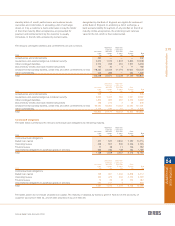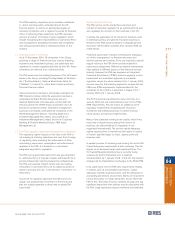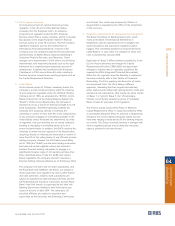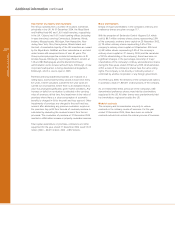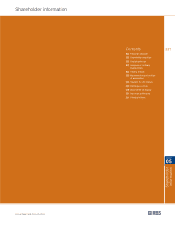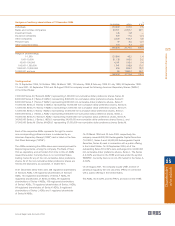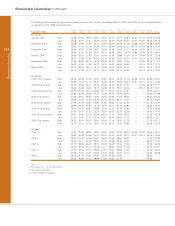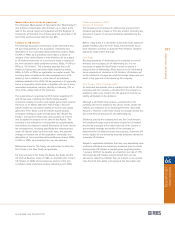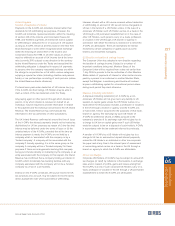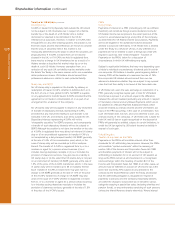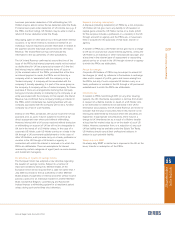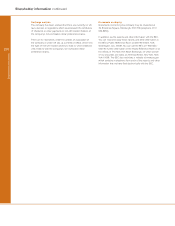RBS 2004 Annual Report Download - page 227
Download and view the complete annual report
Please find page 227 of the 2004 RBS annual report below. You can navigate through the pages in the report by either clicking on the pages listed below, or by using the keyword search tool below to find specific information within the annual report.
section
05
225
Annual Report and Accounts 2004
Shareholder information
Shareholder
information
Memorandum and articles of association
The company’s Memorandum of Association (the “Memorandum”)
and Articles of Association (the “Articles”) as in effect at the
date of this annual report are registered with the Registrar of
Companies of Scotland. The Articles were last amended on 29
April 2004 and have been filed with the SEC.
Taxation for US Holders
The following discussion summarises certain US federal and
UK tax consequences of the acquisition, ownership and
disposition of non-cumulative dollar preference shares, ADSs,
X-CAPs or PROs by a beneficial owner that is a citizen or
resident of the United States or that otherwise will be subject
to US federal income tax on a net income basis in respect of
the non-cumulative dollar preference shares, ADSs, X-CAPs or
PROs (a “US Holder”). This summary assumes that a US
Holder is holding non-cumulative dollar preference shares,
ADSs, X-CAPs or PROs, as applicable, as capital assets. This
summary does not address the tax consequences to a US
Holder (i) that is resident (or, in the case of an individual,
ordinarily resident) in the UK for UK tax purposes or (ii) generally,
that is a corporation which alone or together with one or more
associated companies, controls, directly or indirectly, 10% or
more of the voting stock of the company.
The statements and practices set forth below regarding US
and UK tax laws, including the US/UK double taxation
convention relating to income and capital gains which entered
into force on 31 March 2003 (the “New Treaty”), the prior
US/UK double tax convention relating to income and capital
gains (the “Prior Treaty”) and the US/UK double taxation
convention relating to estate and gift taxes (the “Estate Tax
Treaty”), are based on those laws and practices as in force
and as applied in practice on the date of this Report. This
summary is not exhaustive of all possible tax considerations
and holders are advised to satisfy themselves as to the overall
tax consequences, including specifically the consequences
under US federal, state, local and other laws, and possible
changes in taxation law, of the acquisition, ownership and
disposition of non-cumulative dollar preference shares, ADSs,
X-CAPs or PROs by consulting their own tax advisers.
References below to “the Treaty” are references to either the
Prior Treaty or the New Treaty as applicable.
For the purposes of the Treaty, the Estate Tax Treaty and the
US Internal Revenue Code of 1986, as amended (the “Code”),
US Holders of ADSs will be treated as owners of the non-
cumulative dollar preference shares underlying such ADSs.
Preference shares or ADSs
Taxation of dividends
The company is not required to withhold tax at source from
dividend payments it makes or from any amount (including any
amounts in respect of accrued dividends) distributed by the
company.
Before 1 May 2004, if a US Holder would have been entitled to
greater benefits under the Prior Treaty, that US Holder could
have elected to continue to apply the Prior Treaty to dividend
payments made before that date.
New Treaty
Because payments of dividends by the company to non-UK
investors are not subject to UK withholding tax, it is not
necessary to apply the New Treaty in order to receive a
reduced rate of withholding. Since there is no UK withholding
tax on payments of dividends to US Holders, US Holders will
not be entitled to a foreign tax credit for foreign taxes paid as a
result of the payment of dividends by the company.
Prior Treaty – effect of UK tax credit
An individual shareholder who is resident in the UK for UK tax
purposes and who receives a dividend from the company is
entitled to claim a tax credit in the UK against its income tax
liability attributable to the dividend.
Although a US Holder that receives a dividend from the
company will not be entitled to this UK tax credit, certain US
Holders are entitled to a tax credit payment (the “Tax Credit
Amount”). However, a US holder would not actually receive this
Tax Credit Amount because of UK withholding tax.
Dividends paid by the company and any Tax Credit Amount
will constitute foreign source dividend income for US federal
income tax purposes to the extent paid out of the current or
accumulated earnings and profits of the company, as
determined for US federal income tax purposes. Payments will
not be eligible for the dividends-received deduction allowed to
corporate US Holders.
Subject to applicable limitations that may vary depending upon
a holder’s individual circumstances, dividends paid to certain
noncorporate US Holders in taxable years beginning before
1 January 2009 will be taxable at a maximum tax rate of 15%.
Non-corporate US Holders should consult their own tax
advisers to determine whether they are subject to any special
rules that limit their ability to be taxed at this favourable rate.


